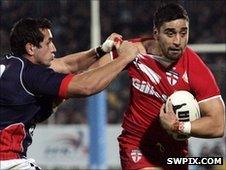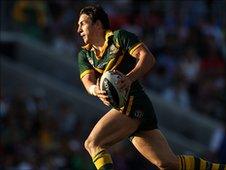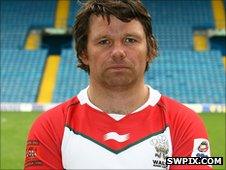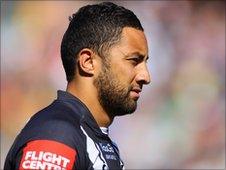Four Nations 2011: Team-by-team guide
- Published
Four Nations 2011: Ready to shine
The 2011 Four Nations gets underway on Friday night with Australia and New Zealand clashing in an eagerly-anticipated match in Warrington.
England begin their campaign against tournament underdogs Wales on Saturday afternoon in Leigh in a game which will be shown live on BBC One.
The tournament, which is in its third year, has seen both Australia (2009) and New Zealand (2010) lift the trophy but this time around, England, under coach Steve McNamara, are hoping to shock their rivals to secure a place in the final at Elland Road on Saturday, 19 November.
BBC Sport looks at the four teams competing while former Great Britain coach and BBC pundit Brian Noble gives his verdict on their chances.
ENGLAND
Coach: Steve McNamara

Rangi Chase could be an important figure in the halves for England
Captain: Jamie Peacock
Four Nations history: Reached the final in 2009 but lost 46-16 to Australia. Failed to reach the 2010 decider.
Last year's results: England 36-10 Papua New Guinea; Australia 34-14 England; New Zealand 24-10 England.
Key players: Sam Tomkins, Rangi Chase, James Graham
Ones to watch: While much of the spotlight will be on Castleford's New Zealand-born Man of Steel Rangi Chase, there is also plenty of interest in the Australian-based pair of Jack Reed and Chris Heighington. Brisbane centre Reed, was born in Keighley while Wests Tigers loose forward Heighington qualifies via his English parents. Both will be hoping to use their NRL experience to good effect in their first international tournament.
Brian Noble's verdict: In the past, the difference between Great Britain/England and Australia and New Zealand has been at half-back, because we have always had the pack to compete. They have had talisman like Darren Lockyer and Stacey Jones to call on, but the inclusion of Rangi Chase, while a controversial one, takes England up a level. Expectations have always been high but in the past they haven't managed to perform at the right time but I have a good feeling this time. If I was Steve McNamara I would be quietly confident but certainly not underestimating the task ahead. They must concentrate for 80 minutes.
AUSTRALIA

Billy Slater will be a key figure for Australia
Coach: Tim Sheens
Captain: Darren Lockyer
Four Nations history: Beat England in the 2009 final but lost out to New Zealand last year
Last year's results: Australia 42-0 Papua New Guinea; Australia 34-14 England; New Zealand 20-34 Australia. Final: New Zealand 16-12 Australia
Key players: Darren Lockyer, Johnathan Thurston, Akuila Uate
Ones to watch: With so much talent in the current Australia team it is hard to choose. In Billy Slater, they have the best full-back in the world who won this year's Dally M Medal as the best player in the NRL but who still has a few questions to answer at international level. This tour also gives British rugby league fans a last chance to see the great Darren Lockyer in action before he retrires. They warmed up for the tournament with a 42-6 thrashing of New Zealand to send out an ominous message to their rivals.
Brian Noble's verdict: Australia are the tournament favourites and will be the ones to beat once again this time. They have so much talent in the team with a solid spine of the likes of Billy Slater, Cameron Smith, Johnathan Thurston and Darren Lockyer before they bring the likes of Cooper Cronk off the bench. They have a point to prove with New Zealand for the defeat in last year's decider and also in the World Cup final. They will certainly be competitive but not compacent and definitely determined to win the tournament.
WALES
Coach: Iestyn Harris

Lee Briers will hope to inspire Wales in the tournament
Captain: Lee Briers
Four Nations history: First time to compete.
Last year's results: Beat France in the European Cup to qualify for this year's tournament.
Key players: Lee Briers, Peter Lupton.
Ones to watch: The absence of Gareth Thomas leaves the already inexperienced Welsh side under more pressure. Much will rest on the shoulders of Briers and his kicking game but there will also be interest in the performances of prop Gil Dudson, who is being linked with a move to Wigan next season, and full-back Elliot Kear and how they can respond against the top international sides in the world.
Brian Noble's verdict: They are the fourth-ranked team and given their inexperience, we shouldn't expect too much of them. Iestyn Harris has a challenge to galvanise his team and although they will be outgunned, they have the ability to challenge for a 15-20 minute spell, but that's not enough at international level. Lee Briers needs to bring his experience and he will have to kick well but it will be massive test for the Wales youngsters in particular and I'll be interested to see how they respond to it. Their opening game against England this weekend probably gives them the best chance of causing a shock.
NEW ZEALAND
Coach: Stephen Kearney

Marshall has been a star performer on the international stage
Captain: Benji Marshall
Four Nations history: Missed out on a place in the final in 2009 but won last year's tournament, beating Australia in a dramatic final in Brisbane.
Last year's results: New Zealand 24-10 England; New Zealand 76-12 Papua New Guinea; New Zealand 20-34 Australia; Final: New Zealand 16-12 Australia
Key players: Benji Marshall, Thomas Leuluai, Fuifui Moimoi
Ones to watch: Full-back Kevin Locke, who made his debut in the recent loss to Australia, has been dubbed the next Billy Slater and was one of the few players to emerge with credit from the game. Scrum-half Kieran Foran will hope to show that he is in the same class as some of the greats and his half-back partnership with Benji Marshall is an exciting-looking one.
Brian Noble's verdict: New Zealand might have a long list of injuries and have plenty of inexperienced players, but they are still players with NRL experience who present a physical threat and can be real gamebreakers. There is a still a nucleus of experienced players like Thomas Leuluai and Benji Marshall, who is one of the best players in the world, but they also have the exciting full-back Kevin Locke. Despite their defeat in the warm-up game, they will be emotionally ready for the tournament opener against the Aussies, which will be a must-see game and could start the tournament with a bang.
- Published12 October 2011